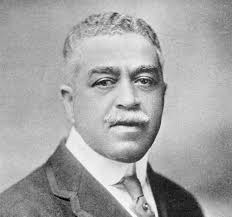Early years
Harry Thacker Burleigh was born on December 2, 1866, in Erie, Pennsylvania. When Harry was a child his grandfather would sing plantation songs to him. Into young adulthood, Burleigh took several jobs as a laborer to help support his family. He sang while at work, and he took advantage of any opportunity to hear musicians who came to town. He sang at school and in the choirs at St. Paul’s and Park Presbyterian churches and the Reform Jewish Temple. After graduating from high school in 1887, Burleigh worked as a stenographer and continued to hone his craft.
Musical Studies
In 1892, Burleigh heard that the National Conservatory of Music was holding auditions for a scholarship. The adjudicators at his audition didn't think he should receive the scholarship, but the school’s registrar intervened, and Burleigh eventually received a scholarship. Burleigh studied voice with Christian Fritsch, harmony with Rubin Goldmark, and counterpoint with John White and Max Spicker. He also played in the orchestra and was its librarian.
Antonin Dvořák
Burleigh spent many evenings singing the spirituals of his youth for Dvořák. He also did manuscript copying for the composer. In January 1894, Burleigh, along with soprano Sissieretta Jones, were the featured soloists in Dvořák’s arrangement of “Old Folks at Home,” presented in New York’s Madison Square Garden. In 1894, Burleigh auditioned for the baritone soloist position at St. George’s Episcopal Church of New York. Although there was much debate about hiring a Negro to sing in the affluent parish, he was selected for the post over numerous other applicants. He made several influential contacts, including entrepreneur J. Pierpont Morgan, who arranged additional engagements for Burleigh.
Artistic achievements
Burleigh completed his studies at the conservatory in 1896 and taught sight-singing there from 1895 until 1898. He married poet Louise Alston in 1898. The couple had a son named Alston. This was also the year that three of Burleigh’s early songs, on texts by his wife, were first published by G. Schirmer. In 1900, he became an editor for G. Ricordi, and he was selected as the first African-American to serve as soloist for Temple Emanu-El. He was a guest lecturer and performer at Black colleges and universities. He became acquainted with composers like Will Marion Cook, Samuel Coleridge-Taylor, and Robert Nathaniel Dett, and academics like Booker T. Washington and W.E.B. DuBois.
Deep River
By 1916, Burleigh had published several works, most of them being art songs. Most notable amongst these were “Ethiopia Saluting the Colors” (1915), and Five Songs by Laurence Hope (1915). Burleigh’s arrangement of “Deep River,” is considered one of the earliest examples of concert spirituals–songs written in art song form. “Deep River,” and other spiritual settings became very popular to concert performers and recording artists, both black and white.
Death & Legacy
In 1946, Burleigh retired. His son and daughter-in-law placed Burleigh in a Long Island rest home a few months later. Then, in 1948, Burleigh was moved to a nursing home in Stamford, Connecticut. On September 12, 1949, Harry Burleigh died of heart failure at the age of 82.
